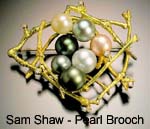| A sting of white pearls- A must, for every womans’ jewelry collection. For generations they have been a sign of elegance and subtle beauty. The royals worldwide have doted on this gemstone, be it our own Rajmata Gayatri Devi to go with her chiffons or Queen Elizabeth with her elaborate royal gowns. Pearls as an accessory holds its ground with whatever you wear it…. 
Valuable pearls occur in the wild, but they are very rare. These are called Natural Pearls. They are formed inside the shell of certain mollusks: as a defense mechanism to a potentially threatening irritant such as a parasite inside its shell, injuring the mantle tissue. The mollusk creates a pearl sac to seal off the irritation. They come in many shapes with perfectly round ones being comparatively rare. Single natural pearls are often sold as a collector's item, or set as centerpieces in unique jewelry. It is said that, in 1917, jeweler Pierre Cartier purchased the Fifth Avenue mansion that is now the New York Cartier store for US$100 cash and a double strand of matched natural pearls valued at the time at US$1 million. Since most of us aren’t as blessed as Cartier, the Cultured Pearl is what is most commonly used in jewelry. A tiny piece of mantle tissue of a donor shell is transplanted into a recipient shell. This graft will form a pearl sac and the tissue will precipitate calcium carbonate into this pocket. There are a number of options to produce cultured pearls: use freshwater or seawater shells, transplant the graft into the mantle or into the gonad, add a spherical bead or do it non-beaded. The large majority of saltwater cultured pearls are grown with beads, the trade name of the cultured pearls are Akoya, white or golden South sea, black Tahiti. The majority of bead less cultured pearls are mantle-grown in freshwater shells, trade name Chinese cultured pearls.  Of the cultured pearls, Black pearls, frequently referred to as Black Tahitian Pearls, are highly valued because of their rarity; the culturing process for them dictates a smaller volume output and can never be mass produced. Then there is the South Sea Pearl which is among the largest commercially harvested cultured pearls in the world. They are the largest in size and can be white, silver, pink, gold, cream, and any combination of these basic colors, including overtones of the various colors of the rainbow displayed in the pearl nacre of the oyster shell itself. Akoya is another variety which is cultured in a mollusk found primarily in Japan and China. Renowned for their luster, akoya are considered the classic pearl. They are generally white or cream colored, with overtone colors of rose, silver, or cream.  A Mabe pearl is hemispherical shaped pearl. Cultured Mabes are grown intentionally, by using a hemispheric nucleus, rather than a round one; and by implanting it against the oyster's shell, rather than within its tissue. The pearl then develops in a hemispheric form, with a flat back. A Mabe pearl is hemispherical shaped pearl. Cultured Mabes are grown intentionally, by using a hemispheric nucleus, rather than a round one; and by implanting it against the oyster's shell, rather than within its tissue. The pearl then develops in a hemispheric form, with a flat back.
It’s partly pearls’ timeless beauty and partly their rich history that makes them so desirable. Its been an inspiration for creative minds such as the famous painting of Vermeers'- Girl with a Pearl Earring or the contemporary jewelry designer Sam Shaws,— Nest Brooch. them so desirable. Its been an inspiration for creative minds such as the famous painting of Vermeers'- Girl with a Pearl Earring or the contemporary jewelry designer Sam Shaws,— Nest Brooch. Nothing is more universal and timeless as Pearls. Its sublime beauty and fabulous lustre makes its very desirable. If you don’t have a piece yet, its time you started exploring to posses one!! |
Comments